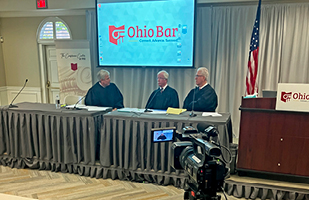Disciplinary System Protects Public

Judge John Willamowski (left) sits as one of three panelists for a mock disciplinary hearing during the Miller Becker Seminar in Columbus.

Judge John Willamowski (left) sits as one of three panelists for a mock disciplinary hearing during the Miller Becker Seminar in Columbus.
When Judge John Willamowski took the oath to practice law 38 years ago, he vowed to uphold the integrity of the state justice system. Over the last decade, he has helped support that promise by being part of the process that oversees attorneys and judges accused of violating the public’s trust.
“Our disciplinary system heightens the public’s confidence in the legal profession,” said Judge Willamowski.
The judge, who serves on the Third District Court of Appeals, is also a former commissioner on the Ohio Board of Professional Conduct. He spent nine years hearing cases involving allegations of ethical misconduct by lawyers and judges. Each year as part of his service, he would attend the Miller Becker Seminar, named after an academic center dedicated to professional responsibility at the University of Akron School of Law.
The most recent seminar, recently held in Columbus, brought together professional conduct board commissioners, who hear disciplinary cases, with the attorneys who investigate misconduct claims. The seminar is a way for attorneys to share strategies on how to effectively investigate cases or advocate for their clients in the disciplinary process.
“You’re making a difference in your profession, helping to weed out people causing harm to the judicial system,” said Judge Willamowski. “You also get the chance to help judges and attorneys who make mistakes to restore their integrity.”
The seminar also provides an overview of the grievance process for those new to it. Disciplinary cases involve investigations and reviews of claims that attorneys and judges are breaking professional standards. It’s a three-tiered system.
When someone has a grievance against an attorney or judge, they must file it with the Office of Disciplinary Counsel or a local bar association’s grievance committee, which is certified by the Board of Professional Conduct to examine disciplinary complaints. The disciplinary counsel or grievance committees then investigates the claims of alleged misconduct. Investigators in the disciplinary system are like prosecutors. They gather information and evidence from accusers and the accused attorneys or judges. If there’s evidence and probable cause to support the complaint, a case is filed, and the accusations are made public. The case then moves to the second level for a disciplinary review by the conduct board.
“It’s similar process to a criminal trial,” said Judge Willamowski. “Three board commissioners will sit as judges on a panel, hear both sides, and write a report.”
The board weighs all the factors of a case, including the accused’s intent and cooperation throughout the process, and recommends discipline if the evidence is clear and convincing. Sanctions range from a public reprimand to permanent disbarment from practicing law in Ohio. The board submits its report and recommended discipline to the Supreme Court of Ohio, where the justices decide the outcome as the third and final tier in the disciplinary system.
At the most recent Miller Becker Seminar, the attorneys who investigate complaints and argue on behalf of clients got to see what happens when they’re done presenting a case. Judge Willamowski sat on a mock panel that demonstrated how the conduct board reviews the nuances of cases. The exercise also allowed attorneys and other attendees to see the focus on fairness throughout the grievance process, and to illustrate the same kind of integrity that people expect from lawyers and judges in the justice system.
“We want to protect people, hold offenders accountable, and try to help those who can learn from their mistakes,” said Judge Willamowski.


